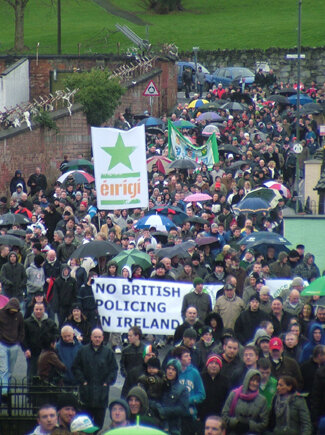Bloody Sunday - 36 Years On
Thousands of people gathered in Derry City on Sunday to mark the 36th anniversary of the Bloody Sunday massacre.
On January 30 1972 the British army’s infamous Parachute Regiment launched a gun attack on a peaceful civil rights demonstration in the city, leaving 14 civilians dead.
The families of those murdered on Bloody Sunday
Just months before, the same regiment was behind a sustained attack on the nationalist community of Ballymurphy in Belfast. Over a two-day period, after the introduction of internment in August 1971, the Parachute Regiment in the Ballymurphy area killed 11 civilians.
Five months later, the same soldiers were let loose on the people of Derry, resulting in more death and tragedy.
Today’s march and rally, which was attended by Éirígí activists from across Ireland, took place as the families of the Bloody Sunday victims brace themselves for the release of the findings from the Saville Inquiry.
The Saville Inquiry was established by the British government in 1998 following years of pressure from the people of Derry and their supporters.
The previous British inquiry into the events of Bloody Sunday – the Widgery Tribunal – was internationally lambasted as a whitewash, after it exonerated the state and its gunmen who were involved in shooting the 14 civilians.
It remains unclear whether the Inquiry findings will admit what the world already knows – that Derry’s Blood Sunday was a deliberate attempt by the British state to drown the democratic struggle in the Six Counties in blood and intimidate those involved in it.
Even if the Inquiry findings do paint an accurate picture of the events on the day, the British government’s recently passed legislation enabling them to keep secret the findings of public inquiries might be brought into play.
Éirígí’s Daithí Mac an Mháistír said it was important for people to stand in solidarity with the families of the victims at this crucial time and to continue to pressurise the British Government.
“The struggle of the Bloody Sunday families over the last 36 years has been a truly inspiring one. No matter what obstacles have been put up against them, they have never ceased in their quest to ensure the British government admits that what happened on January 30 1972 was an act of mass state murder.
“Today’s march is testament to the fact that this issue isn’t going away. The relatives of the victims, the people of Derry and nationalist Ireland are demanding that the British government comes clean and gives the families closure. Anything less would be to heap more insult on top of an already massive injustice.”
Daithí continued, “The murder squads of the British establishment must be held to account. This is still a matter of life and death. It is still a matter of life and death because, less than two weeks ago, an internal British inquiry let the soldier killers of Baha Mousa off the hook.
“Baha, a 26-year-old Iraqi father, was killed in British custody in Basra in 2003. Decades after the Bloody Sunday atrocity, the regiments of the British army continue to kill and torture with impunity around the world.
“Their mercenary thugs remain stationed in Ireland, Afghanistan, Iraq and elsewhere. If a public shaming of their government by Saville provides some solace to the relatives of Derry’s civil rights martyrs and makes Britain slightly more wary about using brute force in the future then the Inquiry will have been worth it.”




